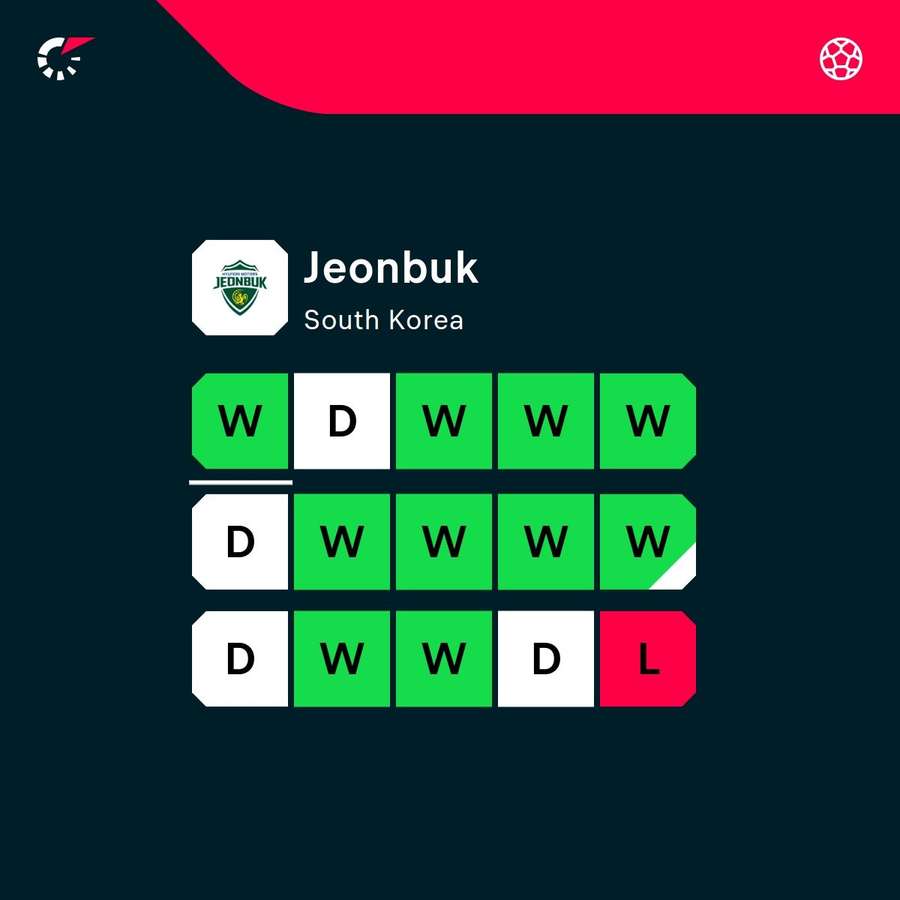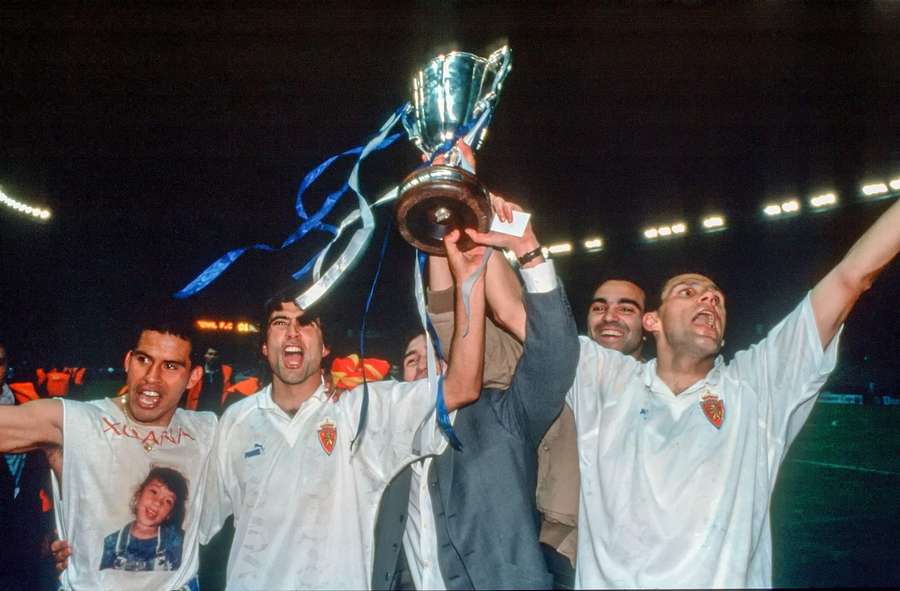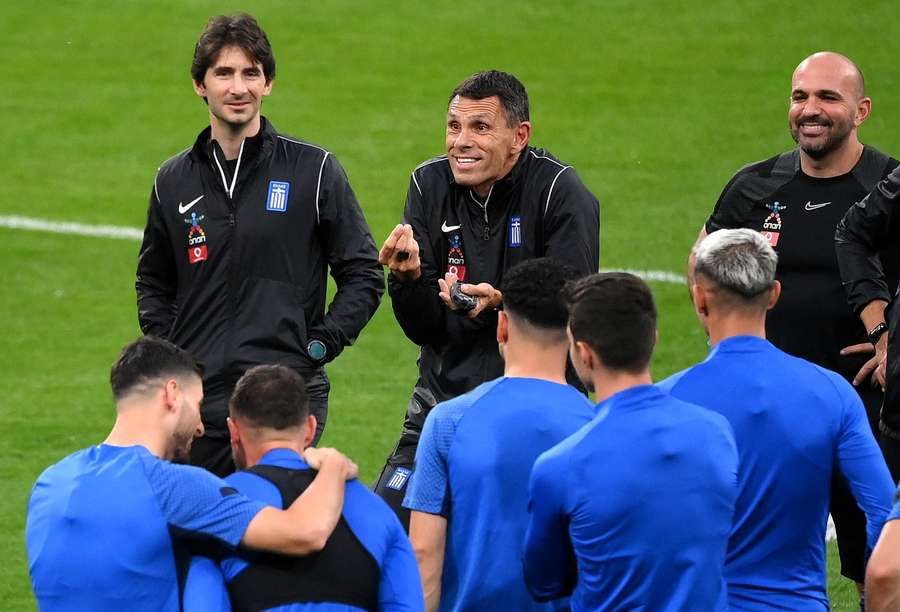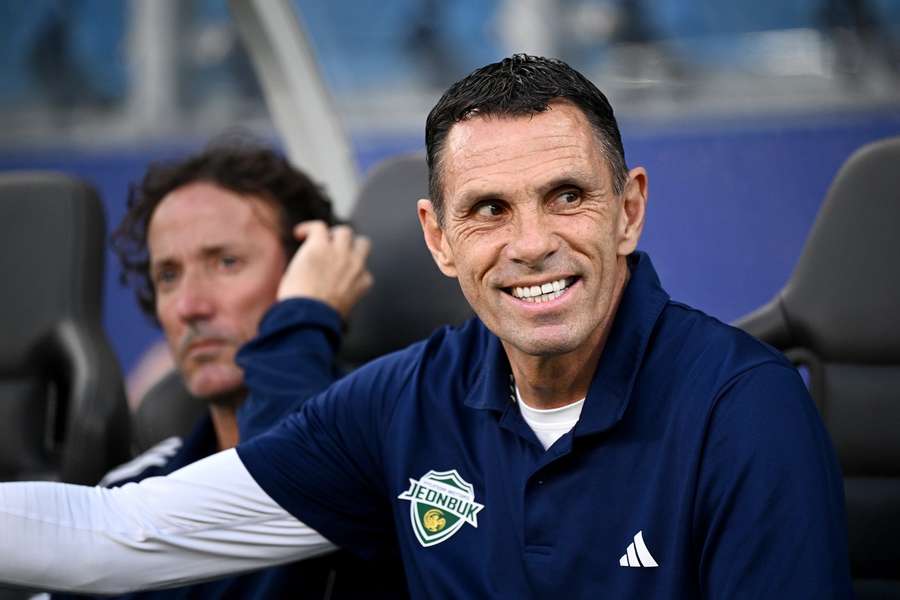Currently the coach of Korean side Jeonbuk, Poyet has also coached Brighton, Sunderland, AEK Athens, the Greek national team and Bordeaux, amongst others.
In what follows, the Uruguayan touches on all those jobs as well as his spells at Zaragoza and Chelsea as a player.
How would you describe the first six months at Jeonbuk?
"Coming to Korea was more personal than tactical or football-wise. And I found it difficult to communicate in the beginning. You depend a lot on the translator. We are, with my staff, we are normal people who use normal words.
"You know, when I want to exaggerate something, I say a lot: 'Even my mom can do it, she's 87 years old.' Now, you never know how that translation will go into Korea, no? For the players, they will say, 'He’s talking about his mom?' So, you need a translator who understands the meaning and uses it the right way.
"Now, in the beginning, they just translate literally. So, you know, I was seeing the faces of the players. And okay, with one, one of the players speaks Spanish very well, and another one, he speaks a little bit of English. They kind of told me, 'Careful with the translation. You know, it's, it's not clear'. So if I really wanted to send a message, I found that I needed to repeat it a lot.
"You never know how long it's going to take you to change the mentality. You don't know. We think we're gonna do it very soon, but you don't have time.
"The impact in the beginning was very good, but then we had a bad spell. It's not the first time that has happened to me. The players reacted very well when I got to the club. There was an adrenaline and an impact in there, and then they got used to you. And then they went flat. So then you need to, like, shake it again.
"And after shaking again, we are flying now. We are, I think we are 12 games unbeaten now in a row. The players got to understand the two sides of the game. Two sides, meaning the attacking and defending. And most of the teams in Korea are very attacking-minded, and they pay a lot of attention to the creation of football, the system. But they are not so organised on the defensive side.
"And I think that even if we consider ourselves an offensive group of staff, I think we're making a difference in the defence because we are not conceding. Right now, we are the team that conceded the fewest goals in the league, so... And that shows that there is a work behind the scenes that is the ugly one. The one that we don't like, defensive work, which is quite boring."

Did you implement any new processes that you had in your previous managerial jobs? Like some of the drills from basketball in Sunderland?
"No, not yet. The situation with the basketball was very specific. We had an indoor area in the training ground where there was a tennis court and a basket in the corner. I couldn't resist having a few shots in basketball because I played all my life when I was young.
"And one day, talking about defending there, I said to my assistant that it would be great if we could explain it here with the basket behind, with the positioning, with the ball, with the player, your shape, you know, the body position. If you don't see the ball, you're wrong. If you don't see the player, you're wrong.
"Then it became very popular because everybody was talking about it. But here our message defensively, apart from one game, in the last five minutes, when maybe we were tired and we lost concentration, it's been proper.
"I think the culture of Koreans is when a coach says something strongly and repeats it, and it's intense… the Koreans, they take it. They take it on board and they say, 'This, I have to do it'."
Do you learn Korean as well? Do you try to learn the language?
"No, normally what I do is this… And, and I regret only once, one place where I made a mistake. That was in Greece. Normally, I see if I want to adapt and I want to stay long. And when I'm convinced I'm going to stay long, I start to study. Okay?
"In Greece, I went into a club (AEK Athens) for seven months and left, then I went into the national team in a very, very difficult moment. And I started studying by myself, you know, with the apps on the iPad. I was able to read in capital letters, I used to put on a radio to get used to the sound. But I said, 'If I renew my contract, I'll get a teacher one-to-one because I wanted to learn', and I didn't. Maybe I promised too much.
"That was the only mistake I made in my career, because when I went to France, I learned French. When I went to England, I learned English because I didn't speak a lot at the time. And depending on the time, really, I think the second year is the better time for me."
How special is it for you personally to work alongside your son, Diego, who is a former player?
"Two things. I will refer to the bad thing for him. He suffered double, because he suffered himself as a coach, but also because it's me. So he took it twice, all that. And when he decided to retire at the age of 24 or 25 years old, which was a shock for us, for me, for my wife, for my family, because he was a decent football player, he went to see me at Bordeaux, 2018. And he came to my house to tell me he didn't want to play football anymore.
"He stayed there for a week or 10 days, and he came to watch the training. When he saw the atmosphere and the training and the way we were convincing the players, he started liking it, you know? Like 'I like this, I like this side of the game as well'.
"So then, when I went to South America in Chile, at that time, my assistant, Tariko, my main assistant who has been with me everywhere, didn't come because of the pandemic. And I really forced Diego to come with me, really pushed him. I said, 'If you wanna do this, you need to do it now. I need you to come with me'.
"The interesting part was that he was never on the bench sitting as a, as a responsible, let's say- because you're a football player, you're on the bench, you're waiting for your chance to play. But here he was sitting there as a coach, and he was responsible, and it was very difficult for him to cope with the stress. Bad, bad. I mean, really bad.
"Then the local television of Chile saw an opportunity to show every Monday our bench... how crazy we were. So, we become like Monday, you know side part of football or whatever you call it. So then we had an agreement. I really said, 'Listen, you cannot sit on the bench anymore'. Because we're becoming like, you know, we're acting now. We've got a camera all the time behind us. And I sent him up.
"When you watch football from the top, it's perfect, because you see all the spaces, you see all the movements, from the bench, it's difficult sometimes. You get used to it, but it's difficult."
Bordeaux аre one of the most successful French clubs and still have a huge fan base despite the drama from the last few seasons. You were very well-accepted and loved there. How would you reflect on your, unfortunately, short spell with the Girondins? What are your thoughts on the downfall and the current situation at the club?
"I had a great time there. I will go back to Bordeaux at any time. I tried to go back when they were struggling in the league. We even got in contact with the owner and told him, 'Give me the chance. You know, give me the chance. It’s not about money, it's about helping you to maintain (the team spot)...'
"He couldn't sack the coach at that time because he had a long-term contract, and then they went down and then what… They disappeared, practically. It hurts. It hurts because I am a football man, okay?
"And I remember my first day at Bordeaux - we trained in the morning, then there was the press conference, and in the evening there was a special auction and a show at the stadium. So I went to the stadium and at the front door, before going in, there were Jean-Pierre Papin, Alain Giresse, Battiston… There were players from the past, for me it was like seeing Gods.
"I remember they said to me, 'Coach, welcome', and I said, 'Welcome? No, thank you… Please, I’m just proud to be here.' With all these players I used to watch on TV playing for Bordeaux and France.
"And then getting to the dressing room on my first game at home against Lyon - they have something that I’ve never seen in other places. You’ve got all the lockers with the numbers and all the famous players who have worn these numbers. So, under every single number, you see names that are unbelievable.
"Sometimes we were joking with the players: 'Do you know who got that shirt? Look at the top… You know, like, proper!' Because the history of that club is amazing, the quality of the players who went through that club is amazing.
"So it hurts, it hurts a lot to see where they are now. I hope that they can slowly… they can come back and get back there. Unfortunately, they couldn't get up this year, but let's hope that they will do it next season."

You won two major trophies with Zaragoza - the Copa del Rey and the Cup Winners' Cup. What does the city mean to you?
"Well, if I say I’m from Uruguay, and even if London is my home now, I have to say my second house is in Zaragoza, my kids were born there, both of them. I played seven years at that club. I always come back when I have time. I need to visit Zaragoza.
"We feel special in Zaragoza, the 25 players who played for the team in 1995. They put us in a place that they shouldn’t, because football shouldn’t put players so high, like on a pedestal. But for a team like Zaragoza in the 90s to win a European Cup… it was totally unexpected.
"You still meet people there, and it happened to me, now they are older, obviously, who see me and they cry. Because they feel like they felt in 1995. I will invite everyone reading this interview to go back to that Winners Cup final and watch the goal of Nayim in the extra time, in the last seconds from the halfway line. That’s impossible to dream about in football, it will never happen again.
"The funny thing about this goal is that everybody from Zaragoza who supports the club knew exactly where they were when that goal happened. It’s unbelievable, and they get emotional.
"So Zaragoza is special. I’m still having this, they asked me to wear it here (shows a red wristband on his right arm). This is something from La Pilarica, La Pilar, it’s a version of the cathedral in Zaragoza. In Spain, when you win a trophy, you go and offer the cup, you know, in a Catholic way to the Virgin. And even if I don't go to the church anymore, because I don't, I'm, I'm Catholic, but I don't go to the church… When I go to Zaragoza, I go to the cathedral. I have to! It's a must.
"So that's for life. Zaragoza is... I always say that I will come back one day and manage there, but the problem is that they always call me at the wrong time - I'm not available or I'm in the worst possible situation for me to be the responsible one.
"And I said, 'Give me a chance. If I go back, at least I'm gonna have the chance to have one full season'. But I hope they get safe this weekend because they are suffering, and they need to win one game, and that's it."
Do you think you can get them back to their previous glory if you return as a coach one day?
"I think it will be amazing. I’ve got plenty of experience now to, first of all, deal with the pressure. Because Zaragoza is a pressure place. I think me, being there and knowing the fans, will give me a little bit more time compared to other places where you don’t have time and in two months you can be out.
"Now they have a very good coach - Gabi (former Atletico Madrid captain Gabriel Fernandez), who I like. I would like him to stay. If he can go up, let him go up, but if he can’t for whatever reason, I would like him to settle the team to play in a certain way. So you can take advantage of what all the coaches have done before you arrive.
"The worst part is when you go and you start from zero. I think that's the biggest mistake in Zaragoza. They change managers so much, and the managers are so different; they play different systems, different ways, different tactics. So you always start from zero. And starting from zero all the time is difficult in football because you need time.
"So I would love to have the chance to go there with something similar to me that somebody has done previously for two or three years. So you go, you take advantage of that. Honestly. Take advantage. You put your input, your details, and you add the players that you think you're missing. And that is you. That is my responsibility. I take it.
"But don't give me a team that is struggling all the time and then playing relegation for three or four years, and ask me to go up. I mean, I'm no magician."
Your spell in Greece was challenging yet enriching. What's unique about Greek football culture compared to other leagues that you've experienced?
"Yes, they are pretty similar to the Uruguayans - very passionate. For good and for bad. So the reactions are very strong. I was lucky that in both experiences I had in there, it worked very well for me.
"Now, there are different reactions, okay? In AEK it’s very, very… AEK. And I want to explain it to you this way: when I went back to the national team, my first six months on the streets in Athens, around Athens, the people who recognised me were all AEK fans. And they would say to me, 'Coach, AEK, AEK, AEK'.
"Now, there was a change. That was when we won our group in the Nations League and we went up. Then I became the coach of the national team. Then I became the coach of Greece. I was no longer AEK, I was THE coach, our coach, okay? So that was a nice touch for me. Like, I became the coach of the country.
"And that made a big difference, because I took the job when the team was completely disconnected from the fans. There were only 7,000, 8,000 people going to the stadium. And when I left, even if we didn't achieve the qualification, we played in front of 30,000. And that's a massive change.
"Like I said to you, I want to take advantage. I love the new coach, Jovanovic. I love him. And I think he took a little bit of advantage from me, which I love, because he maintained a certain group, and he added his own details, which is important. But the people were already there. The connection was already there. So now he's playing every game with a full stadium, which is a great advantage if you play for Greece.
"So this is a country that I’ll go back to for sure in the future. For sure. Put money on it, because for sure I’ll have a chance to go to one of the top teams in Greece in the next five, six years, for sure."

From your perspective, what's the main difference between managing a club and a national team? What's the most challenging part in transitioning between the two jobs?
"I will tell you what is the worst and what is the best. The worst part is you need to simplify your information, pick the right information, because you don't have time to train too much, so you need to pick the details, the most important things for the team.
"The best, and I love it, is that I pick the players. Not the sport director, not the chairman, not an agent, not a scout. I pick the players. And I tell you, that is a feeling that you cannot imagine for a coach. For good or for bad. When I went there, it was a nightmare with the right backs, and we found a right back.
"There was tremendous pressure because I was not calling Fortounis. And Fortounis, first, top man. He was very honest with me. Second, top player. Now, that doesn't mean that because he's a top player he needs to go in the national team, because he is a player with certain characteristics, and I needed to change my system to put him. And the team was doing very well. Why are you gonna change? So it was a little bit of a challenge with the media not to have him on the team. Luckily, Fortounis as a person was top, and he helped me in a certain way not to have an extra problem.
"But that feeling of being able to pick the players yourself, I don't change it for anything. It's amazing. You don't imagine the pressure from everybody. "Call this one, call this one." I pick the players, that's the best feeling.
You faced Krasimir Balakov in that '98 Cup Winners final against Stuttgart. Could you share your memories of what it was like having an opponent like him in the midfield, and overall, your memories of that game against him?
"I can tell you it was all about him. I probably didn't know too many players from Stuttgart. I didn't know too many of the names, but we knew him. And I remember he had a great chance to score. I think it was a good save from De Goey, but we were aware of him.
"Now, we were a team that without being spectacular, that Chelsea team, the strength of that team was that we knew our roles, every player. Because in that final, people remember Gianfranco Zola, Gianluca Vialli, Roberto Di Matteo, Dan Petrescu, Dean White, but our back four was Steven Clarke, the coach of Scotland today, Frank Leboeuf, world champion, Michael Duberry, a defender, big guy, he left the club after that year; and Danny Granville, because the full-backs, the left backs, they were all injured.
"So we were not the strongest, but these four players, they knew their role. And one of the roles was: 'Wherever he is, that special player, you need to be aware and you need to close him down. You don't let him play'. So we played the game based on stopping him.
"I think sometimes there is destiny. I don't think we were better. It was just the typical game finishing 1-0. The one who scores the goal wins the game. So there was not much of a difference between the two teams."
And what about Radostin Kishishev, who’s also your friend off the pitch…?
"Kishi is top, he’s top! The best I got with him was when I called him to come back and help me at Brighton. He was amazing. He came over. He understood the situation, embraced that possibility. We played at Charlton, away, and I analysed them. I knew that the system they played was 4-4-2; we called it 'square'. If we were able to keep playing our system, in which we keep the ball very well, we would be able to play through the middle, not going wide. Okay?
"So we play four, four in a diamond and the two, the strikers. And at the bottom of the diamond, the number six, it was Kish. So he was an important figure in that system. And they had two players up front, one was a little bit heavy, and then one was, you know, the biggest striker and the smallest striker in England.
"And we said, 'Okay, let's move the ball between the two at the back, and they will try to cover Kishishev on the centre half and change, and change, and change…' And they were running, I mean, for fun. And we kept passing the ball, and they kept running until the big guy wouldn't run, and then we would give it to Kishishev, and Kishishev would start the action.
"We’ve done it… I don't know how many times, to a point that was embarrassing for me as a coach, because we were passing the ball at the back without going forward. But until one of the two guys stopped and we attacked through the middle.
"If I don’t remember wrong, we won 4-0. It's one of the games that people remember the most in Brighton's history. It was a spectacular day, and Kish played in that game.
"We created that relationship away from football. And I don’t mean we went to dinner or out to have a beer. No, we didn’t. But we knew that in the game, I was a coach and he was a player, but then in the bus, in the dressing room, we were normal people. And with Kish, who is an exceptional person, it's very easy to get this kind of communication."
